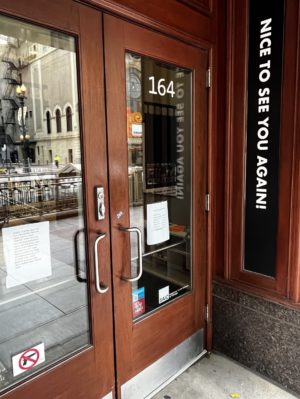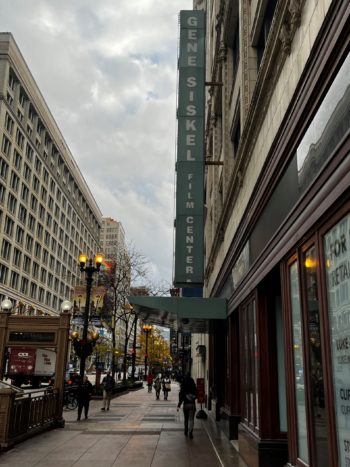The 27th Annual Black Harvest Film Festival returns to the Gene Siskel Film Center after a one-year hiatus due to the COVID-19 pandemic to lavish Black cinema diehards with a bevy of new and familiar feature films, events honoring Black cinema icons, a spotlight for Chicago’s newest motion picture superstars, and more.
 Last year, for the 26th Annual Black Harvest Film Festival, the festival’s organizers, like many film festival organizers around the world, opted to host a virtual festival instead of the traditional in-person variety. Black Harvest Film Festival co-founder Sergio Mims explained that while the virtual festival was a success, there’s no substitute for seeing a film in theaters.
Last year, for the 26th Annual Black Harvest Film Festival, the festival’s organizers, like many film festival organizers around the world, opted to host a virtual festival instead of the traditional in-person variety. Black Harvest Film Festival co-founder Sergio Mims explained that while the virtual festival was a success, there’s no substitute for seeing a film in theaters.
“Nothing really replaces being in a movie theater, interacting with an audience watching a film, and interacting with the filmmakers and the whole vibe and experience of that,” said Mims.
Mims shared on the Black Harvest Film Festival’s opening night this year, during the Chicago premiere of a documentary about Dionne Warwick entitled Don’t Make Me Over, the legendary singer received a standing ovation from the audience when she appeared on-screen via Zoom.
“People were excited that we were back in the theater, and we wanted to come back really big,” said Mims. “We made an extra special effort to make this festival this year really, really special because we’re back.”
For this year, more than 30 films will be screened including both feature-length and shorts. Gene Siskel Film Center programming director Rebecca Fons explained in an email to The Defender more than 100 films were submitted for consideration. Of the films selected, she wrote more than a dozen of the films that have ties to Chicago.
“We consider each submission in a number of ways: quality of filmmaking, uniqueness of the story, and clarity of voice; we ask ourselves how the film might connect with our audiences and/or how an individual film can provide balance alongside the entire slate we’re putting together for the festival. Each film is a discussion – sometimes a debate – and holistically considered,” Fons wrote.
The importance of film festivals like Black Harvest cannot be overlooked. Mims explained the “overwhelming majority” of Black films are made by Black filmmakers outside of the Hollywood studio system without financing from streaming companies.
 “You have all these filmmakers making a wide diversity of movies. Everything from comedy to traumas, to horror to Afrofuturism, it’s really extraordinary. So, what better place than Black Harvest or another Black film festival for these films to be seen?” said Mims.
“You have all these filmmakers making a wide diversity of movies. Everything from comedy to traumas, to horror to Afrofuturism, it’s really extraordinary. So, what better place than Black Harvest or another Black film festival for these films to be seen?” said Mims.
In addition to the screening of films, Festival attendees can sit in on special conversations that address relevant issues facing Black filmmakers such as the future of independent Black auteurs, the ever-changing production, exhibition and distributing landscape for independent filmmakers, and more.
“As things adapt and change, our panels change as well,” said Mims, who is scheduled to lead a conversation about new trends and strategies in filmmaking on Saturday, Nov. 27 at 1 p.m./CST. “That’s something we’ve always done because it is easy to just show movies, but we also want to go beyond that.
Several Black filmmakers, producers, writers, etc. are scheduled to host panel discussions during a screening of their respective films.
Rodrick F. Wimberly (producer, co-director, and writer) and Tressa Epps (producer) The Woodstock of House; Nicole Sylvester (director) MAYA & HER LOVER; Anthony Williams (director) Thicker Than Blood; Kelley Kali and Angelique Molina (directors) I’M FINE (THANKS FOR ASKING); Fredrick Leach (director) CAGED BIRDS; David Weathersby (director) It’s Different In Chicago; Annette Galloway (director) Just A Friend; Thato Mwosa (director) MEMOIRS OF A BLACK GIRL; Dr. Artel Great (director) LOVE WALKS IN; Barry Shabaka Henley (executive producer and narrator) and Tarabu Betserai Kirkland (director) 100 YEARS FROM MISSISSIPPI; and Ryan Polomski (director) and Kamala Lewis (producer) RAYMOND LEWIS: L.A. LEGEND.
“These individuals, and others, were selected based on their relationship with the festival, the unique voices they bring to conversations, and their enthusiasm and engagement with the local filmmaking community,” wrote Fons.
Throughout the year, not just for the Black Harvest Film Festival, the Gene Siskel Film Center provides a platform for Black filmmakers, according to Fons. She encouraged filmmakers to become acquainted with the Gene Siskel Film Center and to be on the lookout for opportunities to partner.
For more information about films and showtimes visit https://www.siskelfilmcenter.org/blackharvest.




